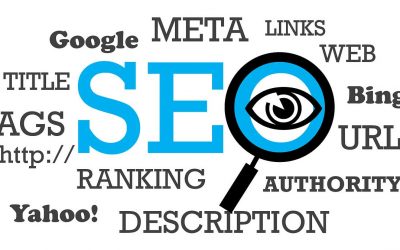Search engine optimization (SEO) has long been the bane in the existence of online businesses, digital marketers and website owners. With all of Google’s algorithm changes over the past few years, it makes it difficult for those that aren’t on top of the industry to know what does and doesn’t work anymore.
Online marketers are constantly having to adjust their tactics and adapt to the newest guidelines that search engines are using as ranking factors. It’s a constantly changing field, which is why it’s so hard for companies to stay up-to-date with what works and what doesn’t.
Sadly, too many people are using outdated information to do their own SEO work and may actually be doing more harm (being penalized by search engines) then good! Look over your website and be sure that you aren’t still using these archaic practices.
Link Building
In the past, digital marketers tried to build as many links as possible to their websites. And, it worked – at the time. The problem is, they didn’t take the time to really analyze the domain links they were building. While building links is still important, you have to build links in a much different way than what has been done in the past.
Past ways of building links included:
- Using automated programs to create links to your site
- Building a link network for the sole purpose of link building
- Linking to a site for no reason other than to get a link back
- Article marketing or guest posting using keyword rich text
- Buying articles or advertorials that included links that passed PageRank
Since around May of 2013, when Penguin 2.0 was released by Google, the focus with links is on quality rather than quantity. Google wants to see links that actually mean something to web visitors.
Links should be built that are relevant and on pages where the readers have a genuine interest in your website. A few links from high trust and high authority websites will have a lot more impact than tons of links that are, frankly, irrelevant.
As a matter of fact, a lot of online businesses are being hit with penalties from bad linking practices in the past, and having to go in and clean them up.
Thumbtack.com, an online service that matches freelancers with potential clients, was recently hit with a manual action penalty that required them to have to contact thousands of their users to ask them to remove links from their sites back to Thumbtack’s site. They have to rely on website owners to do this, and, let’s face it, not everyone will.
While they previously ranked for an estimated 25,000 keywords, Thumbtack dropped off of Google search results entirely, when they were hit with this penalty for bad link practices. The only way they could even rank back in Google again, after the penalty, was via paid AdWord ads. So their organic search rankings went bye-bye.
Directory Listings
Digital marketers have also used directory listings to build links to their own or their client’s websites. Since April of 2012, when Google released the first Penguin update, this tactic no longer works. That algorithm targeted websites with unnatural links and has gotten even more sophisticated since then. It’s important to not have low-quality spammy links from directory websites, to avoid being penalized by Google.
Instead, get listed in niche and industry related directories that have high standards and authority. This will benefit your company by getting your information into directories that people who are looking for your product or services care about.
Keyword Stuffed Content
While it is still very important to have good content, you don’t want to have keyword stuffed content. In the past keyword stuffed articles and content helped search engines find pages that were relevant to what people were looking for.
But, since 2004, Google has used latent semantic indexing (LSI). This type of indexing allows page to be crawled by search engines and the most common words or phrases are combined and identified as keywords of that page. It also smart enough to look for synonyms that are related to your target words.
Now, Google prefers that your pages are written for the user experience, not for their web crawlers. This means you don’t have to stuff your pages with tons and tons of keywords, which often make it difficult to read and understand by the average human. Rather, write quality content that your visitors want to actually spend some time on your page reading. Their crawlers can figure out the keyword situation without all the superfluous keyword stuffing.
Filling Your Title Tag With Keywords
Keyword stuffing used to be used in title tags as well. However, in 2007 Google’s Matt Cutts warned against stuffing your page with keywords for higher rankings. And, this extends to title tags too. Keyword stuffing is totally against Google’s Webmaster Guidelines and is a great way to get yourself penalized.
Ignoring Image Details On Pages
This is one I see all the time with my clients. In the past, ignoring images on your site didn’t hurt you all that much, but now it is imperative that you are using alt tags and image file names to boost your page relevance!
Search engines can’t see images or graphics on websites, so you have to give the image an alt text tag that means something to a search engine, as well as make sure it has a relevant file name to enable Google to know what the image is about.
That means, for instance, if you are writing a page on your site about classic cars and add a photograph, instead of leaving the image name it’s default, give it an appropriate file name. So, your image of a classic Ford mustange wouldn’t be named DCS_1001.jpg, as your camera named it, but rather, classic_ford_mustang.jpg. Now Google knows what it’s about!
Be sure this practice extends to your alt text tag as well. It’s amazing how many clients I see that don’t give their images any alt text tag.
Guest Posting On Sites With No Relevance
In the past, people would guest post to blogs (basically any that would have them), in order to get a link back to their site. The problem now is, if that blog has nothing to do with what you are writing about, or the industry you are in, it is pointless and just another bad link.
Since Penguin 2.0, in 2013, guest blogging has changed. Now you need to focus on doing guest posts, from time to time, on sites that are high authoritative and relevant instead. A few guest posts, on these type of sites (generally industry related), will do a whole lot more for you than tons of posts on bad sites.
Personally, I would rather see my clients focus their time on more social media marketing, including becoming an authority in their industry on YouTube.
Building More Pages Just For Traffic
A lot of people seem to think that more pages equals more traffic. However, simply having pages for the sake of having pages won’t do that. Again, it’s all about quality over quantity here.
While I am a big proponent of blogging, and highly recommend it to my clients, it’s important to make sure that you are blogging about things your visitors want to read. When they click on your page, you want them to stay there, not click back out quickly.
If your post title says one thing, and your content starts off on a totally different subject, you have lost them. Google will start to penalize you if you aren’t creating content that keeps your visitors engaged and on your site.
Cleaning Up Your SEO
If you are using any of the above methods for SEO, it may be time for you to consider cleaning things up a bit and coming up with a better game plan. Instead of spending your time keyword stuffing blog posts and submitting to worthless directories, create some great content that your visitors really are interested in and want to read, and get some relevant backlinks from trusted sources in your industry.
I understand that SEO work can be daunting, especially for a business owner who already has too much on their plate. That’s why we offer a host of managed SEO and inbound marketing services to help them achieve their goals with more gain than pain.
inbound marketing, link building, marketing, online marketing, seo
- Google Shakes Up Digital World: Free Website Service No More! - January 8, 2024
- Unleashing the Power of Storyboarding: A Practical Guide to Designing Outstanding Websites - September 20, 2023
- Why Your Business Needs a Professional Web Consultant: A Comprehensive Guide - September 5, 2023






